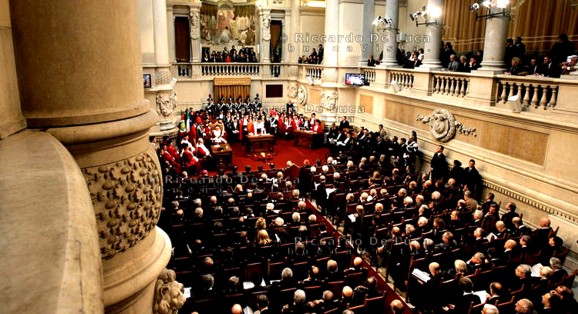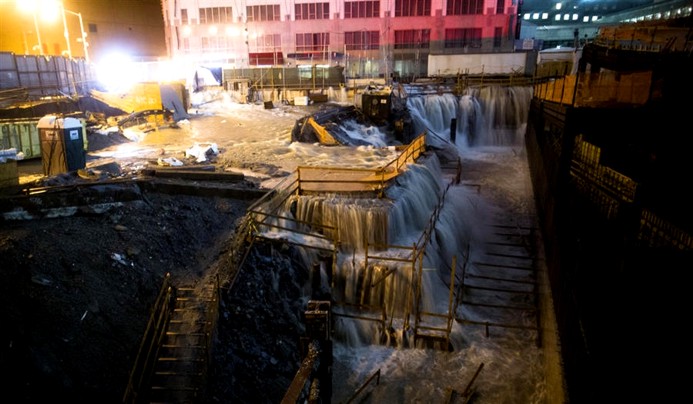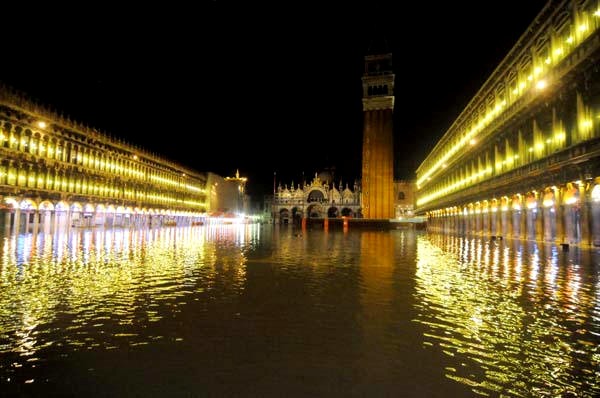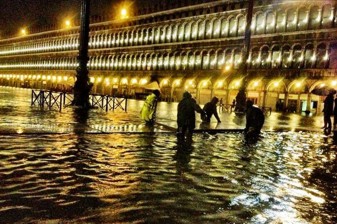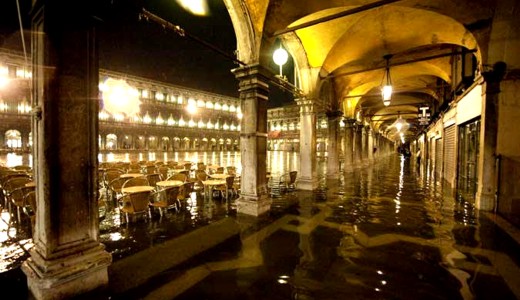
Category: The wider contexts
Thursday, August 29, 2013
Amanda Knox Dithering Over Court Appearance For Appeal Going Over Very Negatively In Italy
Posted by Peter Quennell
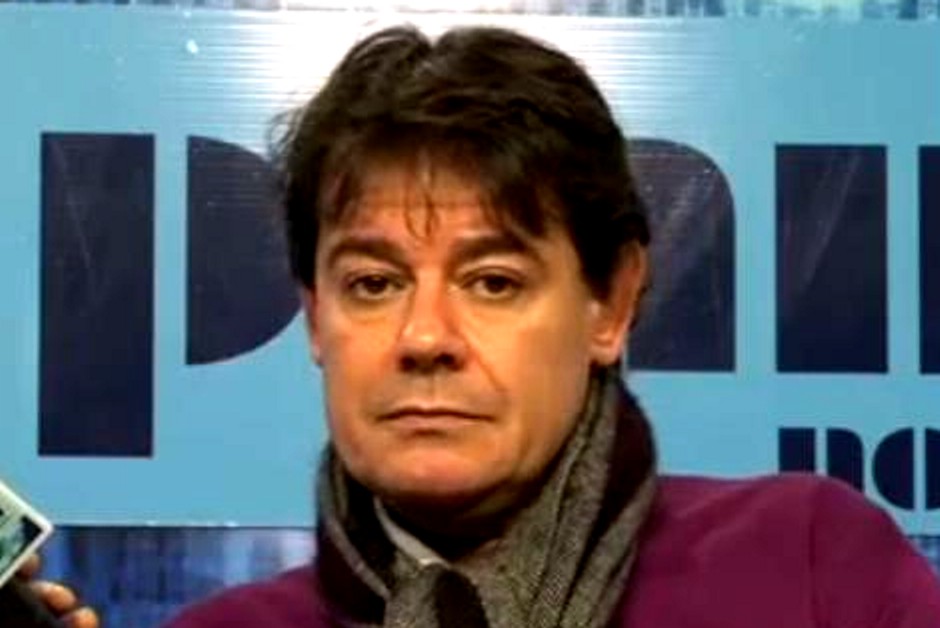
[Above: the outspoken political leader of the region of Umbria Lignani Marchesani warns Amanda Knox]
Amanda Knox has her name on a book that maliciously slimes everybody she ever encountered in Italy. Then she repeatedly goes on TV whining about how people dont like or trust her.
Guess what? Italians are seeing those same wild accusations as being one self-created reason why Knox seems to lack the guts to head for the appeal court. She would be put face-to-face with many of those that she slimed. How embarrasing.
The other reason of course has applied since 2009: Italians believe she really did lead a very cruel murder pack, killed someone vastly more gifted and worthwhile than herself, and now is lying to the American public in the hope that they will insist their government ignores any arrest warrant for Knox from Italy.
She sure has a real knack of making things worse for herself. No-shows are very rare in Italy and they are seen as not only very cowardly but a sure sign of the person’s guilt. Our main poster Jools translated this tart threat from the leader of Umbria’s regional government which is posted on the regional assembly website.
MEREDITH KERCHER MURDER: “IF AMANDA KNOX DOES NOT COME BACK TO FACE THE NEW TRIAL, PERUGIA SHOULD REVOKE THE SISTER CITIES-TWINNING- WITH SEATTLE”.
The chief regional councillor Andrea Lignani Marchesani (Fd’I) seeks to revoke the twinning of Perugia with Seattle, if Amanda Knox does not return to Italy to stand trial for the murder of the British student Meredith Kercher.
“Headlines were not needed nor a crystal ball to forcast that Miss Amanda Knox would carefully refrain from returning to Italy to face the new appeal process. The annulment of the judgment at the Supreme Court shows how the references to international pressures were not unfounded and a clear abdication of our sovereignty for the sake of interests that have nothing to do with justice.
“No need to emphasize once more how the city of Perugia, the Umbria [region] and the University have damage to their image and finances from this tragic event, without forgetting the human aspects and family of the victim.”
Andrea Lignani Marchesani calls to revoke the twinning between the cities of Perugia and Seattle, birthplace of the American woman on trial in Italy. According to Lignani, “The city of Seattle, linked in a sister cities twinning for twenty years with Perugia, lost no time during the time Amanda was in custody to criticize our capital city, either by revoking of the naming of a park [in honor] of the city of the Griffon or by petitions tending to the withdrawal of the twinning itself.
“Perugia has no need for undesirable relationships and should, in this situation where a wound of its recent history is being reopened, should proceed to counter offensive.
If Amanda, as is almost certain, does not show up at the trial and does not face the verdict of the Italian justice system, Perugia must withdraw it’s twinning with Seattle. Court judgments are meant to be respected and must be executed, this is what is repeated every day, and this must also apply to the Seattle citizen Amanda Knox.”
As explained in the post below, the Italian court has many ways of applying its own powerful pressure. It could for example put Knox’s entire defaming entourage on trial, including her own dad, and see them all labeled as felons worldwide.
More on this in our next post, about Frank Sforza, which explains all the grief his own meltdown in court could rain down.
Thursday, June 20, 2013
The Florence Palace Of Justice Where Sollecito And Knox Are Expected To Be Seen In Court Soon
Posted by Peter Quennell
This is a video of a recent light show. The soundtrack leaves something to be desired, but the huge new courthouse looks amazing at night.
We posted previously here on the new Palazzio di Giustizia, which is one of Europe’s largest and most modern. It only came into full operation this year.
It is reported today in UK newspapers that Knox and Sollecito have just been having a meeting in the vicinity of New York, maybe to sort out a common narrative once and for all. Our betting is that each will appear in the Florence court, not least to keep a close eye on the other and to attempt to warm the judges to themselves.
However, their nasty and dishonest books have not made things any easier for them, and have led to a lot of negative reaction in Italy where they have been discussed on TV. It is easy to spot where in many places the two texts conflict, and also where (as demonstrated in the two post below) they also contradict many accepted well-documented facts of the case.
Both books are being considered as substantial new evidence, and the prosecution will ask the appeal court if they can be included in.
Both books are also being investigated, by the chief prosecutors in Florence and Bergamo for separate new felony charges, as they appear to constitute substantial lllegal attempts along with the internet vilification posted by the likes of Preston, Fischer and the Moores, to inflame and mislead public opinion during an ongoing legal process.
The writers have also sought to undermine the officers of the court, by accusing them of serious crimes, again as illustrated in the two posts directly below. Many Italians and Americans with “relevant information” could be called to testify for the prosecution or the defenses. They will probably be asked to explain their own inflammatory campaigns and may face charges of their own. Again, Preston, Fischer and the Moores seem to have painted targets on their backs.
Results of both investigations, together with any new charges against Sollecito, Knox, and their entourages, should be made public well before the new appeal of Meredith’s case gets under way.
If the two are indicted on new charges for the books, as expected, that will mean more to explain, more to try to harmonize upon, more goodwill lost, and more legal bills.
If their Italian lawyers recklessly promoted these daft projects, as texts in the books themselves suggest, the lawyers could all face both contempt of court charges and malpractice suits from their clients.
Nice work….
Saturday, May 18, 2013
Seeds Of Betrayal: In Interview Knox Reveals To Italy Her Considerable Irritation With Sollecito
Posted by Our Main Posters

For some odd reason, Amanda Knox has decided she is not loved enough in Italy.
Could it be because she is widely seen to have lied her way through trial, came across as loud, self-absorbed and callous in her 2009 testimony and court interventions, served three years for framing her her kindly employer, was reported as being just as grubby and tin-eared and sharp-elbowed as ever in prison, slimed Italy though her cohorts in much of the English-language media after her 2011 release, and has now written an illegal blood-money book which once again slams a benign Italy?
In particular it slams the justice system, one of the most popular and trusted institutions in Italy, and its officers of the court, with more proven lies and contradictions with past testimony being unearthed daily.
Apparently in Knox’s mind it was all really Guede’s and Sollecito’s faults.
It was they who tarnished her image. Here in an interview in the current Oggi (which appears just as in contempt of court as last week’s Oggi article now the subject of a criminal investigation) she sets Italians straight.
Translation here was by our main poster Miriam, who is herself in Italy - and in disgust.
AMANDA KNOX: ITALIANS; WHY DON’T YOU BELIEVE ME?
Amanda Knox answers the phone with a bright voice and no signs of fatigue. Strange. She is a veteran of a promotional tour that would have knocked-out a bison. Her book “Waiting to be heard” is selling like mad [it is?] but it will not be published in Italy: our publishers have a - sound - suspect that it would set off a number of complaints for defamation, and they have decided to not publish it.
“I’m sorry” she says. “The Italians believe that I am full of hate for them, but if they had the opportunity to read my book they would discover that there is not a trace of anger in it. It hurts that so many believe that I am guilty, that I wrote the book out of arrogance, for money. It is not true.” Says Knox venting her frustration.
Following the Cassazione’s decision on March 26 to redo the appeal process - which had absolved Amanda and Rafaele Sollecito - the British publishers also pulled back.
“They asked me if I wanted to postpone the book launch. But it is my turn to talk now, and I do not intend to alter my story just because somebody threatens to sue me.” Amanda is nothing if not pugnacious. “Compared to how I was before I came to Perugia, I am quieter, even timid. My family is disappointed: the sunny happy Amanda no longer exists.”
Your personality - the way you reacted to Meredith’s death - caused you many problems at the time.
“People involved in a tragedy can react in many different ways, and your behavior can be manipulated to reinforce the idea that you are the one who is guilty.”
What are you referring to?
“To the infamous images taken outside of the small villa on the day Meredith’s lifeless body was found. Those images were cut and obsessively repeated, so as to only show Raffaele and me kissing.” The message was clear: “their friend is dead and all those two think about is kissing.”
What were you feeling at that moment?
“I hadn’t understood what had happened; I had not accepted the fact that Meredith had died in such a terrible way. I felt lost and sad. I was desperately trying to understand. Raffaele kissed me to console me: since I did not speak Italian yet, there was a linguistic barrier between us that prevented us from giving each other verbal support. And then, to re-enforce the strangeness of my behavior, there was the contrast of the cries of my roommate Filomena Romanelli. She is Italian, she had understood. She had seen Meredith’s room, the body, the blood. Not me: I was in total confusion.”
In the book, Honor Bound, Sollecito writes that your behavior that day was “embarassing”
“I don’t think he was embarrassed . I can understand that he would find me “clingy”. I depended on him completely; I was absolutely clingy. However, he knew how they were looking at us, while I hadn’t considered at all how people might have judged us. I was simply reacting in my lost and disoriented way.”
One of the PMs believes that Guede didn’t act alone. Could he have had an accomplice?
“I can only base my opinion on what the prosecution brought to court.”
And?
“They found another person’s DNA in Meredith’s room, a person that has never been identified. A smaller amount of DNA than Rudy’s. There is Guede’s bloody handprint on the wall, his footprint, his DNA on Meredith’s body. This evidence leads me to believe he acted alone.”
John Kercher, Meredith’s dad, maintains that his daughter had studied karate as a child, and that she would have fought to survive. He believes one man would not have been able to subdue her.
“Of course Meredith fought, but what could she have done against an armed man? Rudy is athletic, and is not small. Mez was minute, she maybe weighed 54 kgs, what good could have Karate done her? Even a man if faced against the likes of Guede, armed with a knife, would not have stood a chance.”
How do you explain Rudy’s calm countenance during the trial? Before being arrested he had told a friend - Giacomo Benedetti - on Skye that you and Raffaele had nothing to do with the murder. After being arrested he started accusing you.
“Yes, it is a strange coincidence. I do not know if he changed his story based on his own ideas or those of his lawyers or the prosecution. I only know that after his story changed, the PM began calling him “poor Rudy” to demonstrate how fragile he was, and consequently how easily manipulated by me.”
When and why did you break up with Raffaele?
“When he “broke” my alibi (during a police questioning, Raffaele claimed to not remember if Amanda had left the house the night of the murder, editor’s note.) It was a shock for me.”
“A shock that combined with the fact that we did not communicate for a long time while in prison erased my feelings for him. In prison I had to focus on survival and put love aside.”
Back in Seattle, James Terrano became your boyfriend.
“We had been together in university. While I was in prison, we wrote a lot, but just as friends. When I came back home, we began looking at each other differently.”
Do you live with James?
“No. At first, I lived with a friend (Madison Paxton, who had moved to Perugia to be closer to her, editor’s note) now I live alone. James is often at my place, we’re very close, but we don’t live together.”
Did you see a psychiatrist to get over your prison experience?
“Only once, I started crying and never went back. I talk with my friends and with my family; I don’t need an “external consultant.” Writing the book was extremely helpful; I freed myself of all my anger and my wounds.”
What will you do now?
“I took a break from university to write my book; I’m going to go back and would like to graduate next year. I would also like to write other books, if I can afford do. My financial future is very uncertain.”
But everyone says the advance on the book was fantastic.
“I’ll just say that I still have not been able to meet my first goal: repay my family for all expenses incurred in defending and staying close to me.” (One and a half million dollars, editor’s note)
People have also mentioned a movie.
..
“I’ve heard the same. I don’t know how being on the set would be; perhaps not as terrible as I imagine.”Is there anything you regret?
“Yes. I regret not having immediately contacted Meredith’s family, of not having expressed my feelings and sorrow to them. At the beginning, perhaps, it would have been possible. It hurts to know that John Kercher believes I’m guilty, and that this belief is based on faulty information. I had hoped that once absolved, the Kerchers would have believed me. But that didn’t happen.
Maybe the new trial will draw out the truth
“That is up to Rudy, but I doubt he will do it.”
In May 2014, Rudy could receive the first permit allowing him to enjoy a few days out of prison.
“That’s crazy. It’s simply insane for them to let a guilty man loose because they refuse to admit they were wrong about me.”
Yes Rudy! What about that? Why did Knox’s own lawyers and the Supreme Court accept that overwhelming evidence proved three people did it?
And why did you say she did it? And why do her own parents believe she did it? How did you accomplish those tricks? Amanda says: speak up.


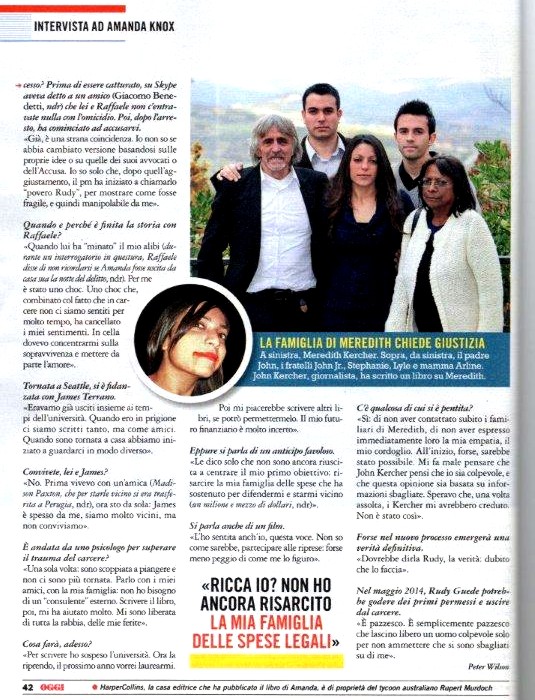
Saturday, April 06, 2013
Giuliano Mignini Promotion Places Him First In Line For Prosecutor General of The Region Of Umbria
Posted by Peter Quennell
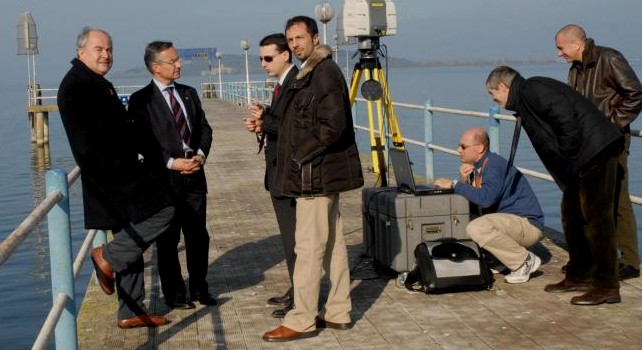
[Above: Giuliano Mignini at left at Lake Trasimeno where Dr Narducci’s body believed bound was recovered]
Umbria of course is the Region for which Perugia is the capital and the current Prosecutor General is Dr Galati who will soon retire.
The post that the popular Dr Mignini was promoted into on his high-scoring merit this past week is one of three deputy prosecutor general posts. The promotion was delayed because of the rogue prosecution against him which Cassation annulled, but he is the most senior and most high-scoring of the three so he should succeed Dr Galati.
We will post the full story (it is a long and impressive one) after our series of posts on the Cassation outcome is done. The story includes an almost unprecedented THREE Cassation wins in just the past several months.
- One obviously was Dr Mignini’s role in the overturn of the Knox-Sollecito appeal and confirmation of Knox’s felony conviction. His main role was to have presented an error-free case at trial in 2009 resulting in the solid grounding of the Massei Report just praised by the Supreme Court.
- One was the final termination of the spurious prosecution against Dr Mignini and Dr Michele Giuttari in Florence by a rogue prosecutor who was desperate to cover his tail after he was (legally) caught on tape incriminating himself.
- One was the Cassation decision to permit the reopening of the MOF-related Narducci case and to confirm that investigations and prosecutions against nearly two dozen who had been seemingly obstructing justice may proceed.
Congratulations to a fearless and effective prosecutor. We will update his full story here soon.
Wednesday, April 03, 2013
The Real Catastrophe For The Defenses That Was The Chieffi Supreme Court Ruling
Posted by Machiavelli
1. Overview
On Tuesday March 26, nine judges of the Rome Supreme Court of Cassation led by the respected Dr Chieffi quashed the previous acquittals of Amanda Knox and Raffaele Sollecito for the murder of Meredith Kercher.
The Supreme Court annulled almost the entirety of the 2011 Hellmann-Zanetti appeal verdicts, declaring the appeal outcome completely invalid on five of the six charges. The Court only upheld the sixth charge which made definitive Knox’s conviction for calunnia for which she had been sentenced to three years.
Calunnia is the crime of maliciously placing false evidence or testimony against an innocent person, something the Italian Criminal Code considers not as criminal defamation but as a form of obstruction of justice, a more serious offence.
Worse for Knox, the Court annulled a part of the appeal verdict which had dropped the aggravation known as continuance, the aggravation that acknowledges a logical link between the obstruction of justice and the murder charge.
2. First reactions
Once the dust has settled, the defendants and pro-Knox and pro-Sollecito supporters and defences may finally realize how severe a defeat has been dealt to their side.
Most American journalists were completely unprepared for and very surprised at the outcome. But most Italian commenters and a very few others elsewhere considered the outcome quite predictable (the criminologist Roberta Bruzzone for example hinted so in written articles, so did Judge Simonetta Matone, as well as John Kercher in his book, and many others too).
This really is a catastrophe for the defences. A complete annulment of an acquittal verdict is just not frequent at all. They do occasionally occur, though, and this one appeared easily predictable because of the extremely low quality of the appeal verdict report.
For myself I could hardly imagine a survival of the Pratillo Hellmann-Zanetti outcome as being realistic.
I previously posted at length on the Galati-Costagliola recourse (that is an important read if you want to understand all angles of the annulment). I argued there that a Supreme Court acceptance of the verdict would have so jeopardized the Italian jurisprudence precedents on circumstantial evidence that it would have become impossible to convict anyone in Italy at all.
The previous appeal trial obviously violated the Judicial Code as it was based on illegitimate moves such the appointing of new DNA experts for unacceptable reasons. It contained patent violations of jurisprudence such as the unjustified dismissal of Rudy Guede’s verdict on a subset of the circumstantial evidence. Hellmann-Zanetti even “interpreted” the Constitution instead of quoting Constitutional Court jurisprudence.
They omitted a number of pieces of evidence, literally “forgetting” them or dismissing them without providing an argument (they should have, being an appellate trial based on the previous findings and arguments of the lower court). The appeal trial had obvious illogical contradictions on a macro level, such as the contradictory putting together of the conviction for calunnia and the acquittal on the murder charge (ignoring a logical link required by statute without introducing any reason at all).
The Hellmann-Zanetti verdict was also based on an illogical processing of all pieces of evidence (such as the dismissal of Nara Capezzali’s evidence without logical reason, even after calling her “credible,” and that of Quintavalle; and attributing the bloody footprint to Rudy Guede on the basis of some ludicrous reasoning).
The appeal verdict basically ignored the concept of “a contrario” evidence, like concluding that the luminol footprints are probably not in blood but in some other substance and not related to the murder (despite failure to indicate any alternative substance nor any reasonable scenario).
The verdict was also biased with open prejudice in favor of two of the suspects in assuming they would be unlikely to even socialize or hang out together with the third, based on social or racial discrimination (two whites from good-looking families are called “good fellows” while the third is “different”).
Beyond the glaring, major faux pas in procedure, the verdict’s low quality, unlawfulnesses, and hypocrisy in its reasoning tended to be pervasive and obvious through all its paragraphs, and possibly this also could have caused an aura of distrust toward the work of the Hellmann-Zanetti court.
One could assess the strikingly low quality of the appeal verdict especially by comparing it to a sophisticated recourse such as the 100-page Galati-Costagliola Supreme Court appeal. While nobody could anticipate with total certainty the Supreme Court decision between the Galati-Costagliola appeal and the Pratillo Hellmann-Zanetti appeal verdict, to good legal eyes the outcome would be as uncertain as the result of an England versus San Marino football game!
EACH of the eleven single mistakes, plus EACH of the six “method” mistakes pointed out in the Galati-Costagliola recourse could by itself have been a sufficient cause for the annulment of the acquittals.
The redundancy of reasons and remarks by Cassation sheds light on the judgment shortcomings from many different angles, and all the reasons presented for the recourse were certainly assessed by the Supreme Court.
But on the practical side, most probably the Hellmann-Zanetti verdict did not even survive beyond the first mistake. The appeal verdict most likely crumbled completely from the very beginning on reason #1, the illegitimate appointing of new experts by Hellmann-Zanetti to re-examine the DNA.
But even given that the defences’ defeat could be foreseen, I never expected the defeat to pervade to this extent.
I thought the appeal verdict might be quashed entirely and a new appeal would start from scratch. But the Supreme Court went further and decided to “save” only the parts of the verdict that were unfavorable to Knox, and declared her conviction for calunnia definitive.
Meanwhile, the Court accepted the Calati-Costagliola reason #10, and quashed the part that denied a logical link between calunnia and murder.
The Supreme Court thus sends Raffaele Solecito and Amanda Knox back to appeal trial, but this time Amanda Knox will enter the trial as a felony convict with a definitive criminal record, which ““ the Supreme Court hints ““ is to be considered logically linked with the charge of murder.
Moreover, judges in the appeal that will come next in Florence will have to follow the decisions set by the Supreme Court. Since the Supreme Court’s motivations report has not been issued yet, we still don’t know what points exactly Cassazione will make. But we can expect that several arguments used by Pratillo Hellmann-Zanetti that were “needed” to acquit Knox and Sollecito will be now declared illegitimate.
This might mean that we will not see for a second time such faulty reasoning as “Knox’s statement can’t be used as evidence of lying because it is not true.” It may not be possible to dismiss the verdict that found Guede guilty of concurring in murder “with others” from the set of evidence just because it was “weak.” It may not be possible to deduce the time of death based only on declarations of Rudy Guede.
We also may not have a chance to again see an expert declaring that contamination is “likely” on the sole basis that “everything is possible.” We also may not have another judge attributing footprints without talking about any measurements.

The Supreme Court session began on March 25, and it is only a rare event that a Cassazione session extends over into two days.
The first criminal division of the Supreme Court ““ scheduled to decide on this case ““ was a five-judge panel presided over by Dr Severo Chieffi. His name never did sound like a particularly favorable omen for Knox and Sollecito. Dr Chieffi is a 70-year-old judge, known for being the author of a famous 2008 verdict which definitively closed a notorious criminal case (“the first time a Cassazione hearing attracted massive live media attention”), a verdict among the most quoted in jurisprudence which is known as that “on reasonable doubt.”
Dr Chieffi and his nine-judge panel explained reasonable doubt as to be intended as an “a contrario” concept, the concept used to formulate a logical reasonable alternative. That verdict pointed out the concept of “reasonable” and also stressed that the nature of evidence is “logical”. “Reasonable” depends only on the plausibility of alternatives, not on how conclusive or reliable single pieces of circumstantial evidence are, and a piece of evidence does not require any specific “physical” element or conclusive quality.
The rapporteur judge was Dr Piera Maria Severina Caprioglio. The rapporteur judge goes through the papers of the whole trial and summarizes their content to the other panel judges; the rapporteur and the president are the two who physically write the report (it may sound like irony that both judges have the adjective “severe” in their name). I was told Dr Caprioglio was a rather stiff judge, known for her scrupulosity in procedure matters, and she is also a specialist “and hard liner“ about sexual crime (maybe that’s why she was chosen by Dr Chieffi as the one to do the research on this case).
At the Supreme Court there is also an office known as the Office of Procurator General, which has more than 50 magistrates. The Procurator General appoints a magistrate (normally called the “PG”) to study cases and to make arguments on all cases dealt with in Supreme Court sessions. The PG is considered “neutral” in the sense that their office represents no party only the “precedents” of the court. While the rapporteur makes a description of the case, the procurator makes arguments about the recourses submitted by the parties.
At 10:30 am on Monday, Judge Caprioglio begun her 90-minute speech summarizing the case. She detailed legal events that led to the first Massei-Cristiani verdict, and then the appeal trial led by Hellmann-Zanetti and their verdict.
She sounded rather neutral; hers was a sheer summary with no comment attached. Nevertheless, it sounded most ominous for the defences: right from Dr Caprioglio’s speech, in fact, Knox and Sollecito’s attorneys understood that they were going to lose.
This is because Dr Caprioglio devoted half of her rapporteur time or more to detailing Massei’s first degree trial and verdict, explaining the arguments and evidence used by the Massei court. Such attention was itself ominous to the defences.
A main basis of the Pratillo Hellmann-Zanetti verdict is in fact a series of denials about the work of the lower court, in which plenty of evidence was simply ignored or dismissed without dealing with the first degree conclusions; while the strategy of Giulia Bongiorno was to entirely “replace” the details of the evidence set with a self-made narrative, quite unattached to actual trial events, which somewhat “worked” as rhetoric and in the media.
Yet Dr Caprioglio was not yet the biggest problem facing Knox and Sollecito. The defence was about to face a pincer front, because the Procurator General’s offices did not appreciate the appeal verdict at all.
A bomb went off with the speech of Procurator Riello which followed next.
Dr Riello recalled the points of recourse submitted by Galati-Costagliola, which may sound technical or subtle to those unaccustomed to them. Dr Riello endorsed the radical censures made by Galati-Costagliola and made clear his own view in an overview of the whole verdict. His arguments had the subtlety of an anvil.
To summarize, he basically maintained the appeal judges had conducted an appeal trial as if they were idiots, and followed the paths of logic, procedure and law like sailors without a compass.
Seen from the point of view of the Procurator General, their way of conducting the appeal trial itself was like a journey through a dreadful series of unlawful steps, decisions informally taken without deliberation, and arbitrary and unjustified ordinances. The court simply “lost their way.”
In the body of their findings, it seems they understood almost nothing about the evidence ““ in particular about how circumstantial evidence works. They did not deal with the findings and arguments of the first instance court as they should have, as if they didn’t exist, and they trivialized the previous legal material.
In fact Dr Riello sounded almost sarcastic; outraged by the incredibly amateurish work of this appeal court, he tended to detail the merit of questions and was interrupted by the president asking him to stick to the discussion on the table.
At the close of his speech, he called the appeal verdict “a rare concentration of law violation, a monument to illogicality.” He said “the judge of merit lost their way in this trial.” Dr Riello noted “they fragmented, they parceled out the pieces of circumstantial evidence.”
He implied not only incompetence but a kind of disingenuous attitude: “The Court employed a fair dose of snobbism for trivializing the first degree verdict, reducing it to four elements. A very imprecise and superficial synthesis.”
He went beyond the criticism expressed in the Galati-Costagliola appeal when he described an obvious bias of the appeal court “not in just a few passages of the second instance verdict ““ it’s as if the defendants should benefit from a kind of anthropological and cultural immunity, in relation to the events.”
He criticized Pratillo Hellmann’s dismissal of Amanda Knox’s handwritten memoir, and recommended that a new appeal trial must in part be based on that statement as “it is a usable document”; and he stressed that in his opinion “the scream heard by Amanda is a significant datum, of great importance.” The behavior claimed by Knox on the morning of November 2, 2007 in his view was “chilling” and her taking a shower in a cold bathroom is a “chilling detail.”
Dr Riello concludes by saying: “These are all conditions for not letting the curtains close on an upsetting and extremely serious crime for which the only culprit found up to the present day is Rudy Hermann Guede, who has been addressed through a Lombroso-style assessment, either calling him a thief, a criminal or a drifter. He didn’t confess and he was not convicted by another court for concurring in a crime together with others, maybe with ‘ectoplasms.’” (A reference to Cassation’s previous decision that he did commit the crime with others, but Hellmann-Zanetti identified no other people; hence ‘ectoplasms.’)
The Prosecutor General also dealt with the DNA experts’ report which defined the previous results as “unreliable.” He implied that the report and its language were used as a pretext by the defences “as a tombstone, while in fact it is not.” It was used as a tool to focus the trial on the DNA and steer it away from the whole evidence set, to “bury the set of pieces of circumstantial evidence which all have their vital value.”
The rhetoric of the defences aimed to “blame everything on those involved in the scientific police who are almost depicted as bunglers; however they are not brigadiers playing with toy chemical sets, they are in fact a highly qualified department and they do employ cutting-edge technologies.”
A severe legal bashing like the Riello speech is not at all common at the Cassazione. As I heard the news on the radio, law experts commented that the event was unusually serious, and they hinted that its consequences may lead to the setting of a historic jurisprudence precedent.
Francesco Maresca ““ who brought his mentor Vieri Fabiani with him ““ endorsed the recourse points and made points similar to Dr Riello’s. He pointed out that a major flaw of the appeal trial was to focus on two DNA instances as if the case was based on them. The court appointed experts to review items with no legitimate basis, they provided an inconsistent explanation for their steps, and then they refused to analyze and introduce further evidence, totally contradicting themselves and also violating the code.
Their criteria for choosing which piece of evidence to discuss or review were totally contradictory, and their series of steps egregiously violated a series of procedural conditions that any court is supposed to follow.
The analyzing of the knife DNA sample and bra clasp sample as pieces in isolation is a sort of device that serves a defence made-up narrative; the focus on “disputed” items and the re-make of a narrative about legal events is simply a defence strategy which is aimed at the media rather than official court proceedings. For the Kercher family, the evidence points to the guilt of Knox and Sollecito beyond reasonable doubt.
The evidence, explained Maresca, consisted of numerous pieces of evidence and reasoning, that were simply not dealt with by the appeal court. The whole process was “non-transparent” and the result is also contradictory given that Knox is indicted by her own words on the crime of calunnia.
Maresca explained that the appeal verdict is riddled with many flaws and errors in the merit of the facts which cannot be assessed by the Cassazione court, but there are also patent violations of law which are “strong and obvious” and of the most serious kind.
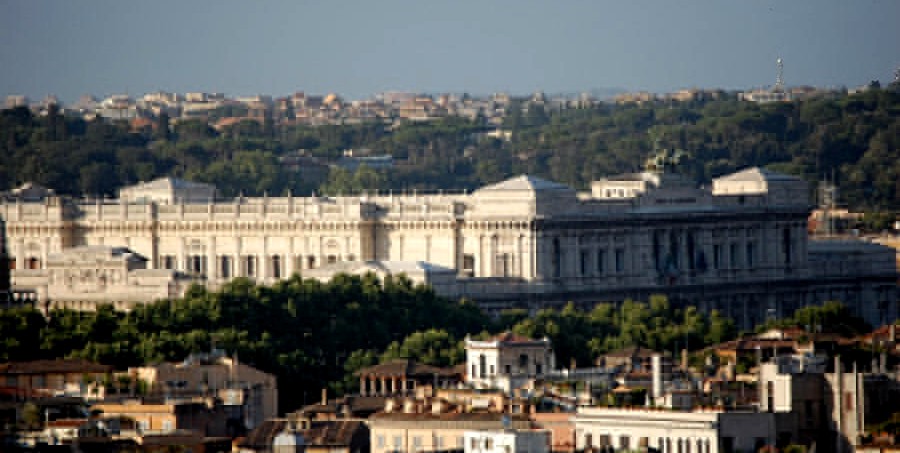
Then it was the defence attorneys’ turn. Giulia Bongiorno knew she would need to apply the full power of her best rhetorical skills: she pointed out a factual error in the recalling of Prosecutor Riello and threw herself head-first into the merit of the evidence.
She even made FOA-style overstatements on the number of Guede’s DNA instances: “So many genetic traces of Rudy Guede were found in the bedroom of the murder, Amanda and Raffaele’s DNA would have been found too if they had been there.” (Her claim is false: in fact, only four samples yielding Guede’s DNA were found in the bedroom, and some were very scant.)
Bongiorno focused on investigation mistakes and complained that Raffaele Sollecito “was put in jail because of a shoe print found beyond the duvet which covered the body, a print that was attributed to Guede.” She also commented on Knox’s handwritten memoir and again put forward the claim ““ already rejected by all the judges of all instances ““ that the statement should be “not usable” because there was a “blackout” of defendant guarantees. Apparently, Bongiorno did understand that the most dangerous threat, and the actual battleground, would be about the danger of having Knox now definitively convicted for calunnia.
Bongiorno said “we do not want to put the scientific police on trial” but then said the point defence demonstrated was that they made “an infinite series of errors.” In fact, Bongiorno’s speech largely consisted of the well-known defense stance of pointing the finger at a list of supposed wrong-doings by the police.
Bongiorno’s argument of pointing out supposed “police mistakes” would probably ring true to Knox’s Amarican supporters, who may find these arguments convincing and effective.
In fact, it was obvious that Bongiorno’s position was extremely weak, and that her arguments were not going to have any effect. The weakness of Bongiorno’s arguments was obvious from the start because she backed into arguing the case only on the merit of investigation techniques.
Her arguments would maybe resonate effectively with uninformed spectators, but they had already failed in those courts that were legitimate, and they have no consequence from a legal standpoint. Talking about supposed mistakes during the investigation and supposed bad behavior of police are good to build a narrative for journalists, but they would have zero effect on expert judges.
I think she knew she was going to lose, but besides being a lawyer, Giulia Bongiorno is also a smart public person, and she plays in the public arena as well as in a court of law at the same time. Her technical stances are all wrong, but she knows she will be remembered well for her good-looking performance.
The president did not interrupt her, showing due politeness toward the defence attorneys. But no attorney would convince the Supreme Court by simply saying “we demonstrated that the investigators made mistakes.”
In order to seek to obtain some positive effect, she should have argued in favor of the Pratillo Hellmann-Zanetti appeal verdict on points of law, and put forward arguments for their legitimacy; for example, an argument in response to point #1 of Galati’s recourse claiming that the appointing of DNA experts was unmotivated.
Luciano Ghirga and Carlo Dalla Vedova had to take care of their own recourse against the conviction for calunnia on the false accusation of Patrick Lumumba. Their line of defence on this point was the same ““ and could be nothing else ““ than what they maintained though all the previous instances. Dalla Vedova deals with the handwritten note where he understands “Amanda says she is confused, she does not care about what she said.”
They reintroduced the myth that “she had been interrogated by the investigators for 54 hours.” They explain ““ almost a paradoxical argument ““ that the document was “a defensive paper” while then becoming one of the elements on which the charge of calunnia was built. They stressed that “she wanted to cooperate” with the investigation and that “she was a friend of Meredith.”
A failure of their arguments was easily predictable because their recourse was built on points that had already failed at lower instances. Some time ago before this appeal, I posted this criticism of the Ghirga-Dalla Vedova recourse on Knox’s calunnia conviction to the Supreme Court:
Pages 3-11: The first argument is about the non-usability of the evidence for the crime of calunnia.
Such an argument is basically the re-proposal of the same argument that had been already dismissed by the Supreme Court in 2008, and subsequently by Massei-Cristiani in 2009 and also by Pratillo Hellmann-Zanetti. Therefore, it is an especially weak argument. Ghirga-Dalla Vedova do attempt to use it again at the Supreme Court because it is what they have.
Just like Giulia Bongiorno will likely recall it too, just like she attempted to request of nullification of Stefanoni’s testimony on procedure grounds before Massei, which was rejected again by Hellmann-Zanetti (the Knox supporters have such a spun perception of the proceedings, they apparently don’t see how some basic defensive claims were rejected by all judges).
Pages 11-14 complete the first argument, addressing the further requirements of the crime of calunnia (maliciousness and voluntarity).
Basically, this point contends that the false accusation was not voluntary or not malicious. The only usable point in my opinion in this reasoning consists of one line, which recalls that Hellmann-Zanetti did not acknowledge the aggravation of continuance for the crime of calunnia. But this point has no consequence because it is a weak point in Hellmann’s verdict itself which violates jurisprudence and logic itself.
The other claims at this point are basically useless; they attack the Hellmann verdict in a way peculiar to the prosecution appeal with an opposite stance. But in fact “not knowing” that someone is factually innocent obviously cannot be extended to an absolute meaning; Hellmann is illogical on that, because he dismisses the logical link with the murder without explanation.
Pages 14-18 speak about the alleged “extreme exhaustion” of Knox in order to exculpate her of her confusion and falsehood.
This argument tends to be a stronger attempt to use some of the contradiction in Pratillo Hellmann-Zanetti, using as a starting point the fact that H-Z did state that Knox was allegedly under excessive pressure. They convicted her for calunnia nonetheless. I think this argument won’t go too far, for two reasons.
First, because it’s basically on the merits; it quotes the whole writing of Knox and requests the SC to directly re-assess the sincerity of her words, something which the SC are unlikely to do.
Second, because while on the one hand there is a contradiction in H-Z as they accuse her of calunnia but do not use her writings as an evidence of lying on the other crime, and they reject the continuance despite the obvious link between the calunnia and the murder, on the other hand the contradiction addressed by Ghirga is weaker. There was in fact no factual finding about “excessive pressure,” neither in the H-Z appeal trial nor in previous Massei testimonies.
As for jurisprudence, pressure and “psychological alteration” itself is not enough to cause a loss of mental faculties to understand and will. Basically, most crimes are committed in a state of psychological stress or alteration, and people are responsible for themselves notwithstanding. The faculty to understand and will is not a psychological condition; it is something that affects the cognitive and decisional functioning of the brain on more basic functions, and requires a medical assessment.
So there is no way the argument of Ghirga-Dalla Vedova can overturn a conviction for calunnia based on an argument of psychological conditions: they have no basis; and there is no consistent ground to assert “excessive pressure” either.
Pages 19-20 is a very short argument about two articles of the code that Ghirga puts in in relation to a case of defensive rights.
This is an argument I am unable to assess clearly. This point basically claims Knox is somehow protected by the law because of an extension of her rights of defence. I have the feeling this point is wrong, because the boundaries of the right to defend oneself are already fixed and limited by a SC ruling of 2008, and because Article 51 only applies to what she declared as a defendant, but not to what she declared as a witness.
Pages 20-22 is only about the sentencing and not about innocence; it claims that, anyway, even if Amanda is guilty of calunnia, the punishment was too stiff and this severity was not logically motivated by Hellmann. This point is the only that could stand, in my opinion.
After the hearing of March 25 ““ which was the ninth case the Supreme Court panel dealt with that day ““ the panel deliberated for six hours, then adjourned the hearing and scheduled the final decision for the following morning.
The question whether to annul the verdict entirely, or to confirm the calunnia conviction, might have been the cause of some of the extra time needed.
When the Supreme Court has to deal with scheduled cases the relator puts a mark ““ between 1 and 8 ““ indicating the difficulty of the case: 1 is the easiest and 8 is very complex.
Almost all recourses are below 3, while a case like the one on the Narducci investigation a week earlier, involving Mignini, could have been closer to 8. The difficulty of this case is unknown. But because of some sensitive jurisprudence involved and because of the articulation of the recourses, this could have been around 6 or higher.
After retirement of the court, and adjournment to the subsequent day, at 10 am on March 26, the court’s dispositivo was the following:
ENDING THE RESERVATION FROM THE HEARING OF 03-25-2013, [THE COURT] DECIDES AS FOLLOWS: ANNULS THE IMPUGNED VERDICT, LIMITED TO THE CRIMES UNDER CHARGES: A) (INTO WHICH CHARGE C) IS ABSORBED), B), D), E), AND TO THE AGGRAVATING CIRCUMSTANCE UNDER C.P. ART. 61 NO.2 IN RELATION TO CHARGE F), AND REMANDS [THE CASE] TO THE CORTE DI ASSISE DI APPELLO OF FLORENCE FOR A NEW TRIAL. REJECTS THE APPEAL OF AMANDA MARIE KNOX, WHOM IT SENTENCES TO THE PAYMENT OF COURT COSTS AS WELL AS REIMBURSEMENT OF EXPENSES INCURRED IN THE PRESENT PROCEEDINGS BY CIVIL PARTY DIYA LUMUMBA, IN THE AMOUNT OF 4000 (FOUR THOUSAND) EUROS, IN ADDITION TO I.V.A. AND C.P.A., PLUS GENERAL EXPENSES ACCORDING TO LAW.
Thus, Amanda Knox and Raffaele Sollecito are sent back to appeal trial in Florence on all charges related to the rape and murder of Meredith Kercher (a, b, c, d, e). And Knox is definitively declared guilty of the obstruction of justice charge known as calunnia, while the argument denying any logical link between the calunnia and the murder is quashed.
Resources used
The article above draws in part upon a translation into English of news information published by various Italian press sources, which our readers may like to look at directly. A good coverage of the case ““ including Riello’s speech ““ was broadcast by RaiNews 24 and they also have a lot of information on the website. Online updates were provided by Televideo. Commentaries and discussions were hosted on Radio1 - GR Rai. Dr Riello’s comments were reported by Il Fatto Quotidiano and Style.it. There were reports on Libero Italy.it. Also details and chronicles were reported at the end of the day by Il Giornale dell’Umbria. Coverage and the quotes for March 25 were provided by AGI. The dispositivo official document was obtained and published by Andrea Vogt.
Saturday, March 16, 2013
The Oil Tanker Incident: Things Between Italy And India Become… Complicated
Posted by Peter Quennell

India and Italy have long been close allies but an incident a year ago perversely reverberates on.
We posted on it here and here with some excellent commentary from our Indian posters Sara and Chami.
Italy maintained that the shooting of two fishermen who the soldiers above had wrongly assumed were pirates happened in international waters, and the oil-tanker company offered to pay substantial damages to the grieving families, which they appeared at one point to have accepted.
But though the tanker was long gone from the port of Kochi, the soldiers remained under house arrest, and in the state of Kerala there remained a disposition to put them on trial though the central government told Kerala they had no jurisdiction. On the say-so of the Italian Ambassador in New Delhi that they would return, the soldiers were recently allowed to return to Italy.
Now it seems Italy doesnt want to send them back. In quick retaliation, the Indian mission to Rome may be in the process of being diplomatically downgraded, the Italian Ambassador to India is being prevented from leaving India, and the Indian Express sees a sardonic side to all of this.
To complicate the lives of the diplomats, Sri Lanka has arrested 53 Indian fishermen which it said were illegally fishing in its territorial waters, and is still holding 19 of them captive. And Italy is seeking to have a number of CIA operatives returned to Italy to stand trial there for kidnapping.
One bit of genuine good news is that piracy is at a five year low. Phew. Thanks for that one.
Saturday, March 09, 2013
Subject To Appeal, Ex PM Silvio Berlusconi Is Sentenced In Milan To One Year For Corruption
Posted by Peter Quennell
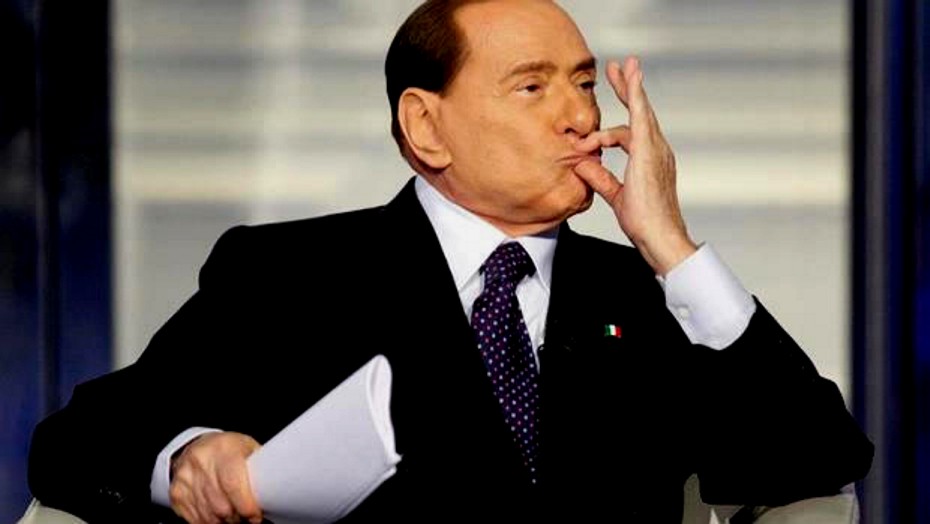
The New York Times reports on this, the first outcome out of three corruption cases..
The story is in line with many previous posts here on the popularity and the efficient and unbending nature of Italian law enforcement. This is a system that has had to contend with a string of corrupt politicians and three mafias, and is slowly but surely winning the wars against all of them.
Silvio Berlusconi, the former prime minister and dominant political figure in Italy, was convicted and sentenced on Thursday to one year in prison for his role in the publication of a wiretapped conversation in a newspaper his family owns.
The verdict, handed down in a Milan court, was the second conviction for Mr. Berlusconi, the leader of Italy’s main center-right political party, in the past five months. It promises to weaken his position further as negotiations begin later this month to form a governing coalition, after inconclusive national elections late last month in which his party, People of Liberty, ran a close second behind the Democratic Party.
After Thursday’s conviction, “it will be difficult for Mr. Berlusconi to have an institutional role in the next government, either in the Senate or in any other Italian institution “” he’s out of the game,” said Sergio Fabbrini, director of the school of government at Luiss Guido Carli University in Rome. “But in the Italian public opinion, there won’t be any difference,” he added. “The country is already divided between those who think he is a criminal and those who think he’s a victim. It’s been that way for 15 years.”
Monday, January 21, 2013
An Overview From Italy #2: Current Perceptions In Italy, Justice Perverters Fail, Mignini Vindicated
Posted by Machiavelli
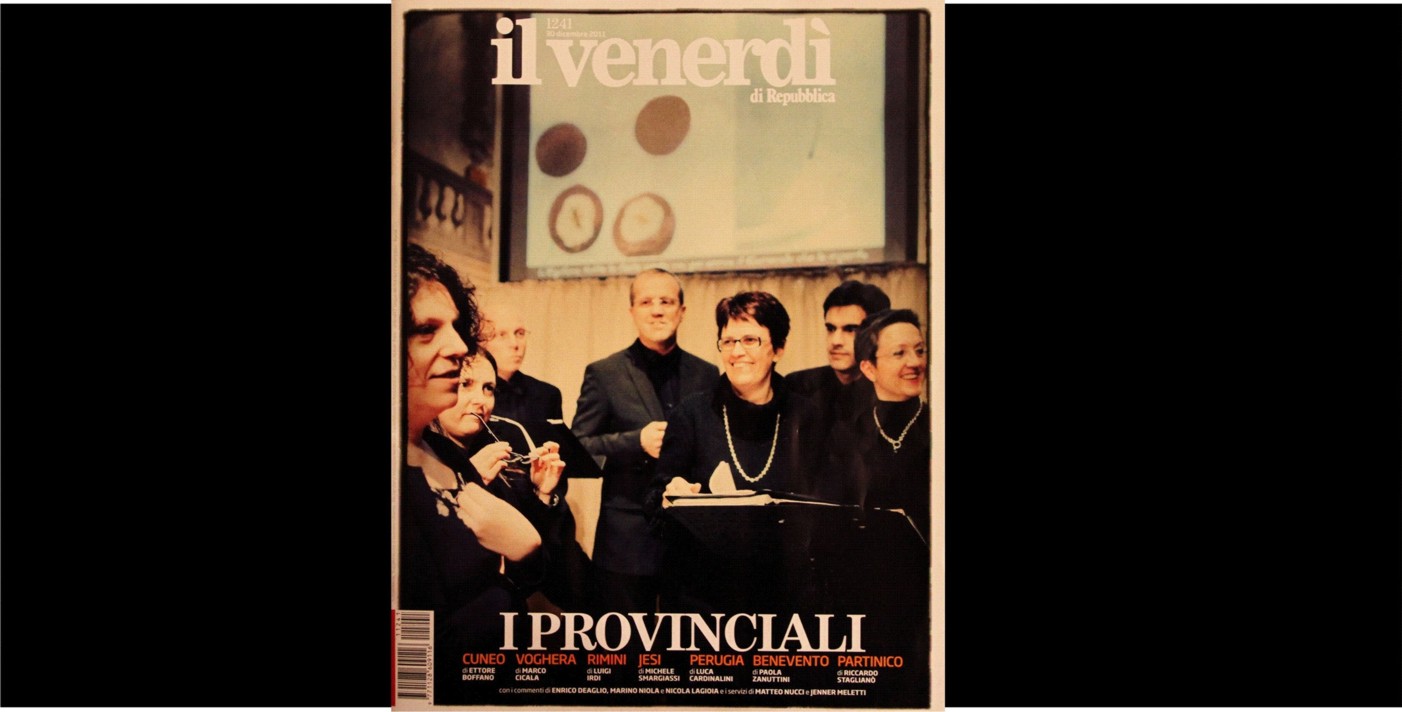
My previous report on the bad news remorselessly building here for the defense was on the Procura Generale appeal to the Supreme Court.
One year ago ““ between the end of December 2011 and beginning of January 2012 ““ there were only rare idle comments in the Italian press about the Meredith Kercher case, more or less sarcastically noting the “suspicious” circumstances of the Appeal trial. I recall how a mention of the topic was dropped into the last number of “ll Venerdì” of 2011.
“Il Venerdì di Repubblica” is the weekly magazine issued together with the newspaper “La Repubblica” (thus probably the most read magazine in Italy).
The cover theme of that week was provincialism ““ or better “the provincials” - the adjective used to assemble a sample of seven little cities (Cuneo, Voghera, Rimini, Jesi, Perugia, Benevento, Partinico), picked from different regions, and taken as examples on the theme, that is stories of “local colour”; what goes on in small “provincial places”. A few characters and stories are brought in to depict the local life of each place, and the voices of local authors adds something about the places.
The article about Perugia (at pages 62-68) was by Luca Cardinalini. In that number of Il Venerdì, having stories of “local colour” as weekly theme, there were shades of ironic tones for each city, often through the voice of local intellectuals. As Perugia is described, the Meredith trial is quickly recalled among its local stories; the reader can’t miss how this is viewed as in connection with another most remarkable feature of the city, that is Masonry.
According to Luca Cardinalini and Enrico Vaime, Masonry is called a “Specialty” of Perugia, like chocolate. Local author Enrico Vaime intends to convey the people’s perception about shady powers existing in the city, about a local environment saturated by plots and informal powers, as something behind recent strange judicial decisions such as the Hellmann verdict and the apparent dropping of the Narducci case. The widespread belief of Perugians that the Public Minister (prosecutor) is the righteous one shines through the words of Enrico Vaime.
Also notice how racism appears to be another key perception about the verdict. Quality media press in Italy has a typical style of understatement. This comment hints that it seems obvious that the Appeal was a racist verdict - and it was “expected” that they would find a way to blame the black one and the outcast.
Some of Perugian “provincialism” seems to include a very narrow localism of Perugian identity: a person from Orvieto is reported to be called “a foreigner” ; but this is because the cultural viewpoint is based on the assumption of a personal knowledge of all people. In among this, there is Vaime’s knowledge about how rooted Masonic tradition and power is in the city, in a scenario of “brotherhoods” and “tribes” (the article includes a photo of the most known “Masonic” monument in Perugia: the gryphon or griffen ““ the emblem of Perugia ““ grabbing a toppled Pope’s Tiara in a sign of rebellion).
The report by Vaime is objectively correct : the concentration of members of Masonic lodges in Perugia is the highest in the world, about 5 times the national average of Italy (which is anyway very high).
In Vaime’s wording decent people in Perugia are ‘Christians’ or ‘Communists’ ““ these are the names he uses to address the main categories he sees as “good” people, two transparent moral systems. He devolves skepticism toward the less transparent allegiances, the murky and informal connections to powers.
I believe these perceptions from one year ago, in this colorful article about Perugia, should be most interesting to the readers of this site.
The first part of the article on Perugia is not that interesting - it speaks mostly about a local character named Ivano Massetti, nicknamed “Savonarola of Umbrian football”, the director (“boss”) of a local TV network and leading showman of his own soccer talk show. I skipped this first part with depictions of local folks, and get to the point at p.66 where the Kercher case is first mentioned.
This is my translation of the article from this point:
[”¦](p.66 line 17):
As Enrico Vaime ““ a 100% Perugian, a writer, and among many other things fiercly provincial ““ already knows: “Only in Perugia do you hear people saying “actually Tizio [random guy] was not a native from Colombella, but from Piccione”, which is three times further”. And when his grandfathers (farther of his father) bearing the same name Enrico Vaime, moved his formal place of residence [to Perugia] from Spello, on the official documents they wrote “emigrated to Perugia and married to a foreigner from Orvieto”.
The roots are extremely deep. “Still today” Vaime says “when I say to my family “we go back home”, I mean here, in Perugia, where I have not owned a house for decades. And I still call the roads and shops with the names they had when I was a child, even if now the owners are foreigners, from Shangai or, as I say, from Terni”.
Vaime is cross with the bad reporters who described Perugia, in the Meredith murder case, as a capital of corruption and vice: “An invasion of charlatan journalists who, as they believed they were visiting a remote and lost province, they painted it as a sort of Chicago on the Trasimeno Lake”.
[The fact] that no Perugian was involved in that sad story, to them that was an irrelevant detail. And the trial ended just the way many Perugians expected: a black guy first wrongly put in jail, another black one convicted, the two white, good-looking, wealthy and well defended young people, free.
So it was that the Public Minister Giuliano Mignini became a target. He’s a Perugian whom the Perugians know as the dominus of the other judicial case ““ this also is, yes, entirely local ““ about which everybody talks and knows, but always in a low voice: the death of doctor Francesco Narducci, the one suspected of having ties to the crimes of the Monster of Florence. From the judicial point of view that was - by half ““ just another hole-in-the-water [a failure] for which some critics have hastily put the blame on some alleged lunacy of the public minister.
But”¦ however”¦ meanwhile, this [Naducci] corpse-swap was indeed found to have been for sure, a kind of unique case in the criminal history of the country. And, for what concerns the recent acquittals of those characters involved in this death, well, after almost a year and a half we are still waiting for the verdict motivations. All of the suspects were esteemed high-class professionals. That’s a perfect mix of strange deaths, sex, lead-astray investigations, and Masonry; this is in the city with the highest number of Masonic lodges in Italy.
Vaime sighs: “Masonry is something alien from me, but I have many friends who are in it. In Perugia it works as a compensation chamber for various powers, but also as an effort for the surge of the spirit to many decent people. Masters, masons and “33”, but all of them decent Perugians”. Masonry is considered a local specialty, just like the bruschetta or the Etruscan arch.
“One day you find out that that mediocre employee of your acquaintance, or the one who performed an incredible career in the public administration or in politics, is a “˜son of Horus’. Then you either laugh, or you slap yourself on the forehead just like saying to yourself “Wow! [how could I ] think about it!”. “That travet* [*a generic mediocre opportunist employee], too”
Vaime says “to me it is a strange Perugian, with little interest for the Egyptian god compared to his covet for entering inner circles of a certain world. Their internal motivation is “I want to see how the lords sit at the table”. But in there [Masonry], you see, there are also good Christians and good Communists; as has always happened in this province, which has the art of living together in its genes”.
[”¦. ]
This month ““ Jan 2013 ““ the Italian press returned to the topic of the case again in a few brief articles. This time it was because of Sollecito’s book.
After Maurizio Molinari’s report from New York on the book in September, and the busting by Bruno Vespa on Porta a Porta of Francesco Sollecito, who ended up openly contradicting his own son’s statements, another hint appeared in the local press about what is cooking up backstage.

This article in Perugia Today has a neutral take, but the same understatement and kind of vagueness as it anticipates that something very likely will happen.
What I find most delightful is the quotation marks in the title around the word “author” ““ journalist Nicola Bossi doesn’t believe for a moment that Sollecito actually wrote the book:
Meredith Case: “author” Sollecito at risk of criminal lawsuit
The recounts about an alleged negotiation in order to pin the main charges on Amanda Knox, and unproven violence by the Perugia Police are under target. Mignini is considering criminal lawsuit.
Written by Nicola Bossi ““ Jan 4. 2013
The Meredith case is not closed, and this despite books and movies almost tend to drop it after the acquittal in second instance of Amanda Knox and Raffaele Sollecito - who were convicted in first degree for the murder of the English girl that took place in Via della Pergola.
On upcoming March the 25th the Court of Cassation of Rome will have to decide on the request for a re-opening the trial, submitted by the Procura with the authorization of Public Minister Giuliano Mignini.
In the environment of the magistrates there is confidence about a [guilty] verdict that many ““ in Italy and in the USA - have heavily attempted to discredit. But from the same environments around them, they talk about a greatly serene Mignini making assessments about the next strategic moves, following the attacks directed against him ““ and against those in Law Enforcement who cooperated with him ““ contained in the book by Raffaele Sollecito.
An upcoming criminal defamation lawsuit is becoming more and more likely every day, especially about some particular paragraphs. The material published by Sollecito has already resulted in discussions and clamor above all about claimed negotiations [with the prosecution] aiming to shift the blame onto Amanda alone, to be rewarded with his immediate release.
But there are also accusations against the Police about violence during his interrogations. “If you dare get up and walk, I beat you up in a bloody pulp and I kill you. I leave you in a pool of blood”. This is what you read in the book “˜Honour Bound’ issued in the US, as what Sollecito attributes to the Perugian officers.
“They wanted me to lie so they could frame Amanda”: this is the premise of the claimed negotiations claimed to indirectly involve Mignini too, which he always denied. Allegedly this would have been enough to get [Sollecito] out from prison soon, leaving the American woman in trouble.
So, these are grave accusations which Mignini apparently does not intend to let go unpunished. The criminal lawsuit is likely to be filed earlier than the date of Cassazione [25 March].
Another small piece of news is this article below published in Leonardo and written by Valentina Cervelli:
It seems basically a “commented” version of the Perugia Today article. Cervelli adds a few polite lines on her own thoughts in this piece, published on the Bbooks page of Leonardo,it; this is my translation:
Is Raffaele Sollecito going be sued soon for “Honor Bound”?
By Valentina Cervelli - 6. Jan 2013
Are there troubles in sight for Raffaele Sollecito? His “Honour Bound” book is going well in the United States in terms of sales, but here in Italy it might be soon result for him in a lawsuit for defamation by the Law Enforcement forces and by the Public Minister Giuliano Mignini.
As we know already, in Honor Bound ““ My journey to hell with Amanda Knox and return Raffaele Sollecito has reconstructed the whole judiciary story from his point of view, telling in his autobiography what [he says] is his own truth.
On March 25 Cassation in Rome will decide on the [prosecution] request for the re-opening of the trial submitted by the Procura authorized by Giuliano Mignini, after the acquittal in the second instance of the two main accused, Sollecito and Amanda Knox.
The young woman has returned back to her country and we bet it’s going to be difficult, if not impossible, to get her back in our country even in case of retrial after Cassation and a possible conviction. But lets leave aside this possible dispute and lets focus on the book. In Raffaele’s book Mignini is iimplicated because he reportedly comes out discredited. In the material published by Sollecito in his book he even talks about alleged negotiations in order to blame Knox alone, obtaining in reward a quick release.
And what about the allegations of Police violence during interrogations? Of course we don’t get into the merits, but it seems obvious that parties that may be considered offended would tend to launch a counter-attack to defend their dignity and their work. At the moment no lawsuit has been submitted. But with much probability that will be done before the decision of Cassazione.
By now we can only wait for the publishing of the book in our country, in order to assess with our minds what Raffaele Sollcito has written and the “hot” material published in his made-in-the-US autobiography.
By the way; one thing Valentina Cervelli might get wrong is the purported good sales of Sollecito-Gumbel’s book.
The Amazon.com site is reliable as quick indicator of a product’s success; the price of a new copy of “Honor Bond” on Amazon.com is now $ 3.51 (last week it was 3.76; the cover price is $ 24). It suggests sales are not quite as expected. The drop speed is significant if you consider that the book has been out for only four months.
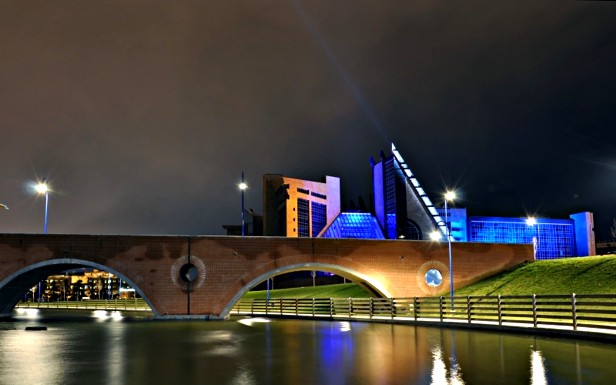
[Above: the Florence Palace of Justice]
While many honest magistrates seem to be working in Florence, there is still some strange behavior by one or two people in the Florence prosecution office.
Iin particular by the chief prosecutor there were some unexplainable decisions. As people reading this site know, Giuliano Mignini and Michele Giuttari were convicted (of some of the charges) in the first degree trial in Florence.
The motivations document was disconcerting because: besides the proof of their innocence on the main charge, what was described as the evidence on the remaining charge constituted extremely weak and vague arguments for what was claimed about Giuttari, while they were totally non-existent about Mignini.
In the second instance appeal as we know the court completely crushed the trial case.
The case against them collapsed not because of a technicality, as the FOAs falsely claimed. In the figment of their imagination the Knox supporters erroneously thought that the Florence court had an “option” to overturn the case, to find Mignini and Giuttari innocent, but that they instead decided to pass the judgment on to some other tribunal.
The pro-Knox believers are probably also ready to believe blindfolded that there was some kind of evidence against Mignini.
The Knox believers are wrong. What in fact happened in Florence is something almost unique in a judge’s career. The first remarkable event was the decision by the Florence court of nullifying the first degree verdict. They did not simply overturn the verdict (neither change, or “reform” it as we say) since an overturning would imply acceptance that a previous verdict actually existed and was legitimate.
The cancellation was in fact an in limine act about the validity , which does not require an assessment about it correctness. The court went way beyond. In fact they nullified the whole trial, not only the previous one in terms of judgment, but also the preliminary hearing, and the indictment; and even the request of indictment.
It is a legal outcome not comparable to a simple change or overturning because it is a ruling that the whole proceeding was illegitimate from the very roots. The investigation itself of Mignini and Giuttari was declared illegitimate.
If elements were found for the opening of an investigation, the prosecutor would be entitled to carry on their duties, though the investigators should be from another territory. This is important because the Florence court found evidence that people from the same office were involved in cases against Giuttari and Mignini, both as offended parties and as prosecutors.
Because of a basic conflict of interest, the local prosecutors were incompatible and the Procura of Florence had no jurisdiction. Not even Genoa would be compatible.
Florentine prosecutors therefore had no right to bring cases against Mignini and Giuttari. The investigation files now must now be sent to the competent jurisdiction ““ where they should have been sent from the beginning ““ which is Turin; there other legitimate prosecutors will decide if and how there is anything to investigate about, and if there are any charges to bring against anyone. The Florentine trials should have never taken place. The court ordered that the legitimate investigators are the Procura of Turin.
In addition, they also ruled that the court of Florence would be an incompetent jurisdiction in any further possible case that stems from that investigation: since the competent prosecution is Turin, in case elements for the indictment of anyone for any charge are found, in the future, everything should go to a court in Turin ““ this, only if there will be any charge to bring to court .
This decision in Florence was a total debacle for the Florence prosecutors. It is in fact “politically” much worse than an overturning of a verdict. It is not just a like a different conclusion on the merit, it is the decision to take away even the investigation from them, a kind of implicit censure of their work as highly illegitimate.
But at this point in the procedings, something even worse and even more strange happened. The Procura of Florence did something even more unusual, in fact unprecedented as far as I know.
Apparently the Florence prosecutors are not happy at all to pass the investigation file on to Turin. For some reason they seem instead to want to do unnecessary and irrelevant hard work instead. The Florentine prosecutors impugned the decision and revisited this at the Supreme Court against the Florentine judges.
This step is almost unheard of because the decision of the Florence appeal court is of a type that manifestly cannot be impugned at the Supreme Court. The recourse is obviously going to be declared inadmissible. If that submission was done by a private citizen, they would get a heavy fine for that.
Here it is a power in the Florence judiciary branch making this inadmissible move; for unknown reasons.
I’d like to know the real motive behind the latest Florence move, the only effect of which can be a waste of time (and money), a delay, of at least one or maybe two more years, which only makes the failure of the whole proceeding against Mignini and Giuttari more likely due to lapse on an expiration terms.
I say “I’d like to know” but in fact one motivation stands out as obvious: the whole proceeding against Giuttari and Mignini, from the first bringing of the charges at the lower courts, appeared as having a wasting of time among its purposes.
One practical effect - maybe a practical purpose - of pushing the charges against Mignini, was taking the file about the Monster of Florence case links with the Narducci case away from Perugia. By this move, the Florentine prosecutors managed to factually put their hands on the Narducci-MoF file and remove it from the investigating powers in Perugia.
Another effect of this was delay. Now this latest move looks as if its purpose were to delay, as much as possible, the transfer of the legal documents to Turin.
What is the ultimate event that, by all this, they seem to be seeking to delay? I can’t know for sure, I can only guess; in fact, I have only one answer, which also stands out as something obvious for those who know a bit of the backstage:
Giuliano Mignini is not an ordinary magistrate, he belongs to the Anti-Mafia Territorial Division of Umbria, and recently was selected for a further promotion by the Supreme Council of Magistrates.
In fact what is delayed is the advancing of Mignini’s career: in fact he has been already promoted to a directive function; but, by the rules, his taking the post was frozen while awaiting the outcome and conclusion of the Florentine prosecution.
Prosecutor Mignini is de facto already functioning as a prominent Magistrate in Perugia and considered as such; but formally he has not been given the directive power. Several people ““ among them Spezi and a number of his journalist friends, but possibly also other much more important people too ““ are likely not at all eager to see Mignini awarded further power.
About the latest endeavor by Raffaele Sollecito, who became liable for criminal defamation by writing false allegations about Mignini and others in his book, I expect - as logically unavoidable ““ that several powers and subjects will basically have no option but taking legal against him.
There will be a strategic necessity to doing this in order to prevent extradition issues in the future, but also, above all, on principle, because Sollecito made false claims about public institutions that needt to have their names cleared. Considering the kind of allegations against the judiciary as an institution, and considering that Mignini is a judge of the Anti-Mafia Division, this is the kind of lawsuit that I see as likely to be submitted on a national level, in Rome.
If that is the case, it would not be the only strange thing that the courts of Rome will deal with.
It seems like there is a kind of “curse” on proceedings related to the Narducci case. All sections of the Supreme Court which have been asked seem to have attempted to declare themselves “˜incompetent’ about re-opening the cases related to the Perugian doctor. The Cassazione is a huge office with a hundred judges working there, but maybe not so many of them are eager to deal with this case.
This could be only a coincidence. It only brings up to my mind, through a free association of thoughts, a more generic question ““ a personal question of mine ““ that is whether the words “Masonry” and “Politics” have an echo in Roman corridors too.
*****
Finally I want to add another significant piece of Italian news.
The news a week ago was that the Procura of Florence is investigating a possible corruption/mafia plot involving construction enterprises and politicians that revolves around the building of a new high speed railway in Florence.
Some 31 people are being investigated and among them is the former governor of Umbria. A huge drilling machine ““ nicknamed the “Mona Lisa” ““ used to dig subway tunnels in Florence was sequestrated by the Procura.
In the last couple of years Perugia’s prosecution office had a main role in fighting political corruption, but it seems that the Florence Anti-Mafia division is also active, just as it was in the times when the prosecutor Vigna worked with them.
Vigna was the one who first evolved the “secret sect” scenario in the Monster of Florence case, raising unexpected problems among the Procura staff.
Monday, December 10, 2012
Italian News Through February Will Be Dominated By A Surprise Election
Posted by Peter Quennell
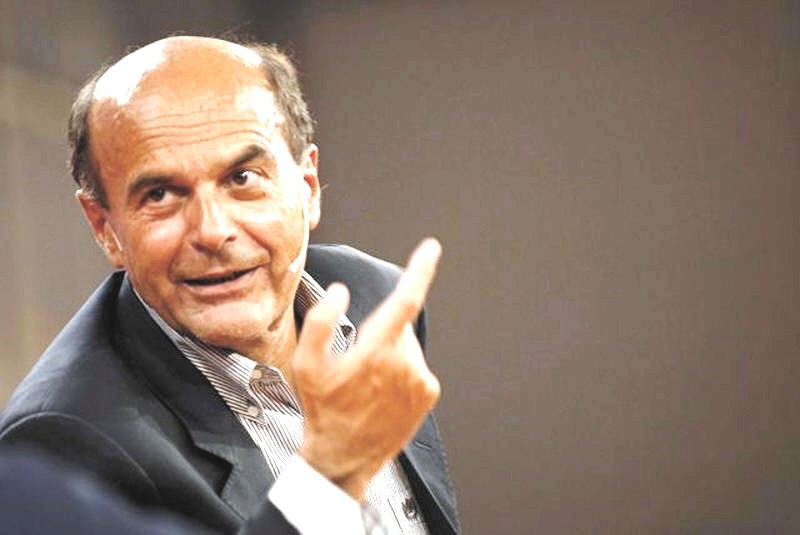
[Above: Pier Luigi Bersani, the probable next prime minister of Italy]
Prime Minister Monti is leaving, with most of his reforms pushed through, after Ex-PM Berlusconi’s party withdrew support.
Berlusconi announced he would again seek to be Prime Minister but his flouting of law, slimy ethics and previous wrecking of the economy don’t exactly make him the front-runner.
The front-runner in fact is Pier Luigi Bersani, the leader of the center-left Democratic Party, who has said he will sustain the reforms his party helped Mr Monti put in place.
Italy doesn’t usually have primary elections but the other day it did and Mr Bersani really trounced a leadership bid by the young mayor of Florence, Matteo Renzi (image below).
Mr. Bersani, 61, who has been the secretary of the Democratic Party since 2009, ran as the favorite, with nearly the full support of the party apparatus and its elected officials. He easily defeated Mr. Renzi, winning nearly 61 percent of the vote.
But Mr. Renzi’s message of change rang forcefully with a sizeable chunk of the center-left electorate, with over one million supporting him. He also attracted a considerable number of mostly young center-right voters whose frustrations with Italy’s influential and pervasive gerontocracy obliterated party lines.
It is a message that Mr. Bersani may have heeded. Speaking to supporters on Sunday night, he said his greatest challenges were to change the center-left and to “prepare paths and spaces to give opportunities to new generations.”
Austerity as a precursor to strong growth had already been taking a lot of knocks as the evidence that it is a cure-all is pretty slim and it creates terrible unemployment. Center-left governments (as in the US) are doing well these days.
The IMF was once the grand inquisitor of the austerity movement but is increasingly inclining toward the Asian mixed model, in part because it is there the IMFs cash and leadership increasingly come from.
This might be quite a help to Mr. Bersani as he confronts harder-line EU leadership and bond markets.
[Below: Matteo Renzi who lost primary but may affect Italy’s direction anyway]
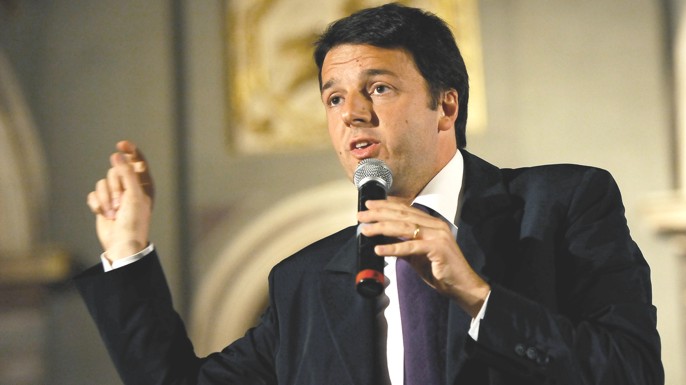
Wednesday, November 21, 2012
What New York And Venice (Surprise Surprise) Suddenly Find They Have In Common
Posted by Peter Quennell
1) New York
Plus more images down below in Comments.
2) Venice
Plus more images down below in Comments.

